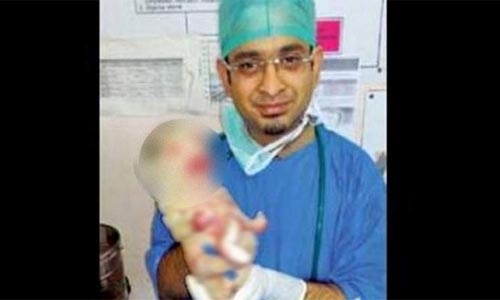India's first 'Harlequin baby' dies two days after birth
New Delhi : India was in for a medical first this week as a baby girl, born with a rare congenital disorder died on Monday in Nagpur after a two day struggle to live.
The 1.8-kg baby girl was born with Harlequin Ichthyosis, a disorder that occurs once in 300,000 births and a first for India, where her body was covered with thick plates of hardened, cracked skin and her internal organs visible.
The baby also known as a 'Harlequin baby', a name given to babies born with this rare genetic disorder, was born to a farmer's family in Nagpur, Maharashtra.
Dean of the hospital, Dr Kajal Mitra, confirmed that the baby was suffering from respiratory problems because of complications in chest expansion due to the dead skin to the Deccan Chronicle.
"The survival rate for a Harlequin baby is extremely bleak and the babies generally succumb within hours or days of birth. Our senior medical experts were observing the baby 24/7 and I had personally contacted my colleagues in the US and UK to constitute a line of treatment. But, considering that there is such little research done about the disease, and this particular case was an extreme variety of the disease, unfortunately the baby passed away at around 4.30 pm," he said.
Born around 12.45 a.m. at Lata Mangeshkar Hospital, the first child to a farmer-couple from Wadi, the child is currently in the NICU and being attended by a team of medicos who were conducting a series of tests and investigations on the baby.
The child presented a sad picture with large parts of her body without skin and internal organs visible. Her palms, fingers and toes had barely developed. There were two reddish swabs in place of her eyes and her nose was just two holes and ears were practically missing on her face.
Dr Yash Banait said such children have severely cracked skin which makes it difficult to maintain body temperature and they become prone to infections.
Renowned paediatrician Dr Avinash Banait said there was a similar case in Bastar, Chhattisgarh in 2014, but it would not be medically proved.
Besides this, there have been only around a dozen-odd such recorded cases in medical history since 1750.
The first such child was born in April 1750 in South Carolina, US, and there are reportedly around a dozen such cases recorded in that country. One such child Nusrit Shaheen was born in 1984 to a Pakistani woman and four of her children had the same disorder and succumbed at an early age.Another such male child was born in 2013 to a woman in South Africa and was given a slim survival chance, but lived more.
Related Posts

